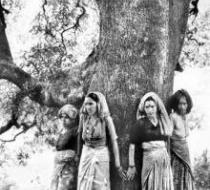Chipko Movement Favorite
The forests of India are a critical resource for the subsistence of rural peoples throughout the country, but especially in hill and mountain areas, both because of their direct provision of food, fuel and fodder and because of their role in stabilising soil and water resources. As these forests have been increasingly felled for commerce and industry, Indian villagers have sought to protect their livelihoods through the Gandhian method of satyagraha non-violent resistence. In the 1970s and 1980s this resistance to the destruction of forests spread throughout India and became organised and known as the Chipko Movement.
The first Chipko action took place spontaneously in April 1973 and over the next five years spread to many districts of the Himalaya in Uttar Pradesh. The name of the movement comes from a word meaning 'embrace': the villagers hug the trees, saving them by interposing their bodies between them and the contractors' axes. The Chipko protests in Uttar Pradesh achieved a major victory in 1980 with a 15-year ban on green felling in the Himalayan forests of that state by order of India's then Prime Minister, Indira Gandhi. Since then the movement has spread to Himachal Pradesh in the North, Kamataka in the South, Rajasthan in the West, Bihar in the East and to the Vindhyas in Central India. In addition to the 15-year ban in Uttar Pradesh, the movement has stopped clear felling in the Western Ghats and the Vindhyas and generated pressure for a natural resource policy which is more sensitive to people's needs and ecological requirements.
The Chipko Movement is the result of hundreds of decentralised and locally autonomous initiatives. Its leaders and activists are primarily village women, acting to save their means of subsistence and their communities. Men are involved too, however, and some of these have given wider leadership to the movement. Prominent Chipko figures include: Sunderlal Bahuguna, a Gandhian activist and philosopher, whose appeal to Mrs. Gandhi results in the green-felling ban and whose 5,000 kilometre trans-Himalaya footmarch in 1981-83 was crucial in spreading the Chipko message. Bahuguna coined the Chipko slogan: 'ecology is permanent economy'.
A feature published by the United Nations Environment Programme reported the Chipko Movement thus: 'In effect the Chipko people are working a socio-economic revolution by winning control of their forest resources from the hands of a distant bureaucracy which is concerned with selling the forest for making urban-oriented products.'









